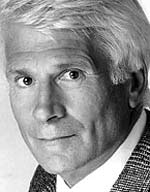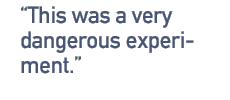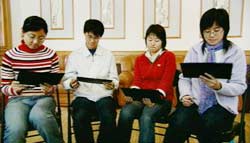Veteran filmmaker Antony Thomas, producer of FRONTLINE's "The Tank Man" documentary, discusses filming in China, government minders and the circumstances surrounding how he was able to show the banned picture of the tank man to students at Beijing University.

Filmmaker Antony Thomas
Was this your first trip to China? What was it like? What did you take away from your experience filming there?
This was my third visit to China. The first time I filmed there, the subject was non-political, and everything went smoothly. But once you choose a political subject like the Tank Man, you walk a tightrope. There is a huge responsibility to get to the truth, yet you are working under severe restrictions. Every location you choose has to be pre-approved, and every shot you take is monitored by government minders. To create a fair and representational film, you must find ways of getting around the restrictions.
Was it difficult getting permission to film in China?

Yes. It is difficult, and the process takes many months.
Tell me a little bit about your handlers over there.
All foreign teams applying to film in China must employ (and pay for) a permanent government minder who is supposed to monitor every shot they take. Outside the large cities, local officials also get in on the act, and on several occasions we had five other officials behind the camera. I never discussed the film with any of them, and tried to keep social contact as relaxed as possible.
You have some striking footage in the film of a 2005 farmers' revolt. Can you tell us how you obtained that footage?
This footage was taken by a local villager, who sent it anonymously to the Beijing correspondent of The Washington Post.
There's a scene in a factory dormitory where you are interviewing three female workers, and you pan the camera to show this cadre of officials, sitting on a bunk taking notes. What was their reaction to you turning the camera on them?
You may find this difficult to believe, but the officials didn't notice that the camera had panned over to them. I can only surmise that they were watching and noting the interviews so carefully that they were unaware what was happening with the camera.

Students from Beida University looking at a photo of the "tank man."
Can you talk a little bit about the scene where you show the 1989 Tank Man photograph to the students from Beida University in Beijing?
We had only one minder present that day, and fortunately for us, he was an elderly gentleman who had been taken out of retirement. I have studied the faces of those students and listened to their answers again and again and am convinced that none of them had a clue about the Tank Man. You must remember that the authorities are extremely sensitive about that picture, and if any of those four knew that they were looking at an infamous, banned picture, at the very least, there would have been a nervous sideways glance. But there's nothing. The first student to respond whispers under her breath (presumably so that we won't hear her) "Must be a parade or something." She is genuinely baffled. Then the boy on her right whispers, "'89," but she makes no connection. Nor do any of the others. My firm opinion is that he was the only one who sensed that the photo had something to do with the events of 1989, but the Tank Man meant nothing to him.
Did you later explain the picture to the students?
No. I definitely did not discuss the picture later. This was a very dangerous experiment. Indeed, one of my Beijing friends warned me beforehand that the least we could expect was confiscation of our tape. The only way I could handle this was to interview the students on all kinds of innocuous subjects for 20-plus minutes to relax them, and then to produce the photograph. Once we had registered their reaction, I deliberately moved on to another bunch of innocuous questions. This was important, as I felt sure that the minder wouldn't jump in and try to stop the session if I kept the discussion going into other areas. Immediately the session was over, the minder took me to one side and asked me if I had produced the tank man picture, but by now that incident was just a tiny fragment in the middle of a one-hour discussion, and he decided to let the matter rest.
Since you shot the film there have been some developments in China: the Chinese Communist Party has announced some reforms to help rural Chinese; at least one region has done away with the tuition fees that are such a burden on rural families. Do you think the Chinese government is beginning to address some of the problems covered in the film?
A quick glance at the figures puts this latest initiative into perspective. In March 2006 and with much fanfare, Premier Wen Jiabao promised an extra spending of 42 billion yuan (approximately $5 billion) for the poor in rural areas over the next 12 months. The lowest estimate for the number of rural Chinese peasants and their families is 750 million. So that works out to an extra $6.67 a head -- per year! And this from a regime that has increased its official military spending by nearly 15 percent, to $35 billion in 2006. I say "official" spending because the U.S. has accused China of spending three times as much as the official figure in 2005. So whether it's military spending or spending on the poor, one needs to view these figures with caution. It's another challenge of figuring out this very secretive regime.